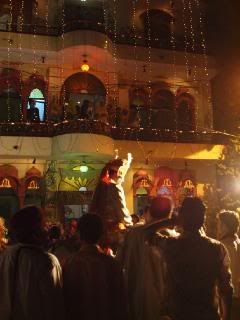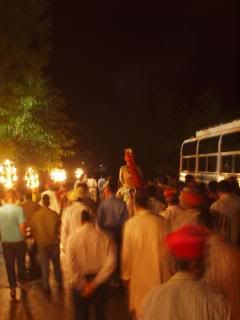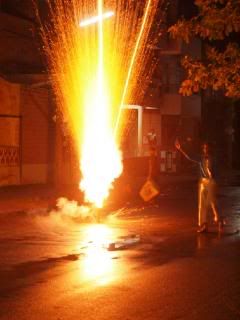I try to refrain from day by day recounting. I find such writing style to be boring and that writing about every day diminishes those that are truly extraordinary. Occasionally, however, events unfold in a way that justifies sequential retelling.
---------------------------------------
The day after the sandstorm was surreal. The city, shrouded in a dusty patina, seemed calmer than usual. Cows and wild hogs munched on green branches felled by the raging winds of the previous night. People roamed the streets searching for possessions that, untethered, had been blown away forever. My previously nameless coworker, Keth Singh (pronounced kett-sing) told me that a number of unfortunate people, caught on the road when the storm hit, had been killed in traffic accidents or by falling power lines. The third pre-wedding party was planned for that evening. Everyone hoped that it would be a little less eventful than the previous night had been.
Ten minutes after the power failed, as Jodhpur settled into twilight, the city was hit by an aftershock sandstorm. Far less in intensity than the first, the wind raged for no more than five minutes before subsiding. Although the power remained off, as it had the night before, the party went on. Illuminated in darkness, a ten-man marching band played surprisingly somber tunes in the foyer of the guesthouse next door. I was the first, and last, person to clap at the end of the opening tune. The crowd stared at me awkwardly as I nervously retreated into the shadows.
Having by the third night proven my worthiness as an honorary Rajput drunk, one of the guesthouse family members, Jitendra (Jitu for short), asked me if I would like to come to his room for a drink.
“When in Rajputana…” I replied.
His mustache twitched uncontrollably; clearly confused by the lame pun he shouldn’t have understood.
“Um…never mind. What are we drinking?”
“Special Rajasthani spiced liquor,” he beamed, flashing me a self-assured, yet unsettlingly sleazy grin.”
I entered the bedroom and was introduced to a discernibly clean-cut man perched on the edge of a wooden folding chair. He wore a cream colored Nehru suit – the other guests wore slacks and button down shirts. After answering the standard battery of questions – Where from? How much money do you make? Are you married? Why no girlfriend? – I asked Mr. GQ what he did for a living.
“I’m a police officer,” he replied, too quickly.
“No he’s not,” Jitendra quipped. “He’s CID,” (The Indian equivalent of the CIA).
After shooting Jitu a look of threatening contempt, the man excused himself to use the toilet in the hallway. He didn’t return.
Over glasses of watered down spiced liquor Jitu and I began to discuss the merits of arranged versus love marriages.
“Arranged marriages,” he explained, “far better is than love marriage. The man worships the woman and works to pleases. Look at your culture…too much divorces. In my culture we enters marriage with high expectation – In yours we enter with very low expectation, isn’t it?”
I disagreed with him and, as diplomatically as I could, explained my thoughts on the matter. Eager to paddle out of the treacherous waters our conversation had entered, I asked him about his family.
“I marries in 1999,” he began. I has it three children; my oldest son is fourteen.”
I stared at him quizzically, affording him the opportunity to correct either his marriage date or the age of his first-born. Spurred by my look, Jitu finally realized his error.
“Ah, Benjamin, you are very good with math,” he exclaimed without a hint of embarrassment.
“Umm…I play a lot of darts," I sarcastically replied.
“I call my wife’s and ask,” he said as he retrieved the cell phone that hung beneath his shirt from a lanyard around his corpulent neck. He seemed to be as amused as I was as the phone began to ring. “Hello sexy,” he crooned before diverging into Marwari for the remainder of the short conversation.
“I marries in 1995,” he giggled as he put down the phone and reached for his rapidly diminishing bottle.
“Jitu,” I said, “I may not know much about arranged marriage, but I do know that in my culture misjudging your anniversary by four years is grounds for divorce.”
He put down his glass. His mustache quivered again as he carefully considered his words. Locking eyes with me, he solemnly replied, “and that, I think, are the problems with love marriage.”
We ventured outside when a female arm, ornamentally adorned in fractal henna patterns, cracked the door to tell us that the groom’s procession was about to begin.

The downpour that had followed the lesser sandstorm had finally ended and, now, reflections of string lights danced in rippling puddles on the street in front of the guesthouse. A Marwari horse, bred for battle and distinguished by curved ears that touched at the tips, stood snorting, awaiting its soon to be betrothed rider. Silver tassels shimmered at its haunches – brilliantly colored pom-poms, woven into its chestnut hair, bounced with flicks of its mane. Banu Pratap, the lumbering Rajput groom adorned in the full regalia of a maharaja, tenderly approached and mounted his stallion. Silent lightning, too high up to be heard, exploded deep within the clouds overhead. The procession of one hundred people set off, shuffling in time with the too-fast tribal drumbeat that resonated between buildings on either side of the waterlogged cul-de-sac.

Left of the mob walked ten chandelier-bearing children, strung together by the frayed power cord, dragging through puddles, which linked each luminescent pewter lamp. Every twenty or so meters we would come to a halt behind Banu’s warhorse. One of the Nepalese boys from the guesthouse would run ahead and light a firework in the middle of the road. He made a show of sprinting away as quickly and frantically as possibly before the charge rocketed out its cardboard mortar tube, detonating and momentarily eclipsing the brilliantly electrified sky.

We reached our destination, a hotel one kilometer away, and said goodnight to the groom. He and his closest friends would spend the night there drinking and regaling in the final night of his bachelorhood. The women would be staying in Jodhpur, uninvited to the actual wedding ceremony. The rest of them, Banu’s entourage of one hundred Rajput men, would be traveling 500 kilometers to Mandawa the next morning – and with them would be me, the comically conspicuous foreigner.
The Indian Marraige is one beautiful kaliedescope of events, images and reactions. Glad you are getting to be a part of one.:)
ReplyDeleteEvrything thing about it strikes you as bizaare but so.... endearing.
Just chanced across ur blog in IndiaMike.
Love the way you write.